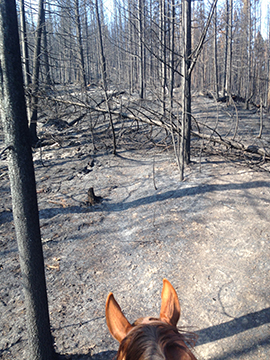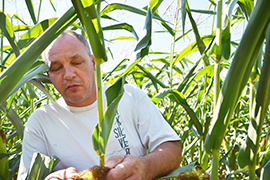PORT ALBERNI – How is it that a tiny island in Washington state has the first farmer-run community food safety lab in the US, satisfying the rigid requirements of the US Department of Agriculture and the US Food Safety Modernization Act?
Part of the San Juan Islands, an archipelago just south of BC’s own Gulf Islands, Lopez Island is tiny at 120 square miles. Home to just 35 farms, it has limited land and resources, and is separated from the mainland by the cost and inconvenience of a ferry. It is home to 700 people in winter and 5,000 to 6,000 in summer.
But what really sets Lopez Island apart, explained Dr. Claver Bundac at the Islands Agriculture Show in Port Alberni, February 4, is that it is a “community where continuous improvement is a necessity for survival.”
“They have an adventurous sense of imagination and a strong community spirit so they wanted a community lab,” he says. “They embrace collective problem solving to get co-operative solutions. They consider food safety a culture and not just a requirement. They take pride in what they do.”
The sustainable agriculture and rural development program of the Lopez Community Land Trust (LCLT) actively supports small-scale sustainable agriculture in the San Juan Islands, with some notable successes.
In 2001, LCLT unveiled the first USDA-approved Mobile Meat Processing unit in the US. This allowed Lopez farmers to legally slaughter livestock on-farm with USDA inspection but without the ferry rides.
More recently, Bundac, a Lopez Island resident and founder of California biotech firm Biomedix which develops food safety testing systems, collaborated with LCLT to open FoodMetrics Laboratories.
The labs Biomedix sets up are usually designed to run within large food production companies. Biomedix had never set up a community food testing lab before but Lopez Island farmers were interested in the model. Changes under the US Food Safety Modernization Act meant that community food testing could be “a local answer to a national question,” says Bundac.
Safe food
The national issue is the regulation and protection of food: food sold to the public must be safe, wholesome and authentic and consequently, the new act requires regular testing of food and processes. On an island, everything is small-scale. It’s expensive and time-consuming to go off-island and cost-prohibitive for everyone to set up in-house labs.
LCLT provided space and Biomedix, through its Food Metrics division, set up the lab – a gift worth US$6,000 to US$8,000 (about $7,500 to $10,000 Canadian) – to provide food and environmental testing to people for their farms and food processing operations. The lab opened in January.
Producers are able to book time in the lab to analyze their products, an arrangement that gives them control over the information they need to meet their statutory requirements.
While the original idea was for farmers to receive training and certification to use the lab, the majority want someone else to do the work. Web-based lab information is collected and benchmarks are developed from cumulative anonymous data.
“It all boils down to a risk assessment system. You need your own data to benchmark or you have to use extrapolations from big data, big companies and apply it to smaller operations,” says
Bundac.
Other advantages of the community lab include:
- eliminating or reduce shipping costs;
- lower testing costs;
- producer-specific data;
- faster results;
- lower risk of sample contamination;
- flexible testing schedules.
- Based on the Lopez Island experience, the BC Small Scale Food Processor Association and the Comox Valley Economic Development Society are working to develop a community food analysis lab in the Comox Valley. Bundac has already set up a demonstration lab at the Vancouver Island Technology Park.

 Rising from the ashes
Rising from the ashes